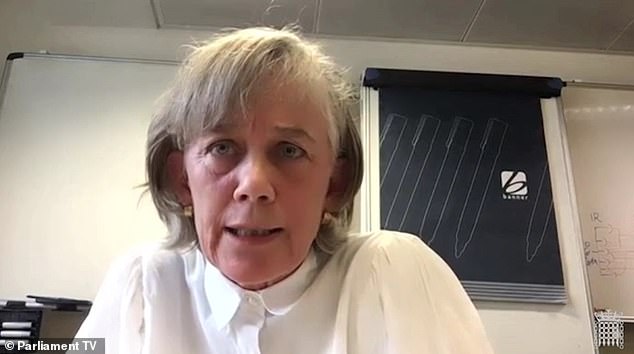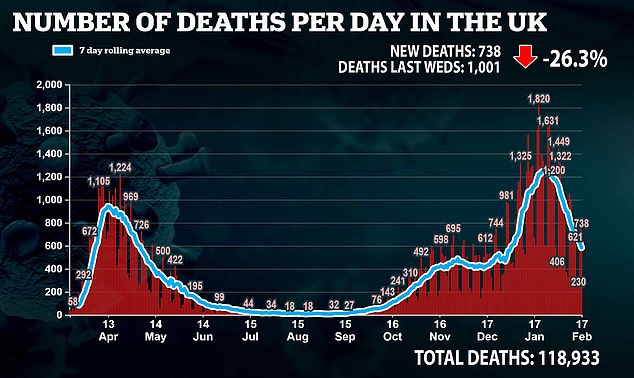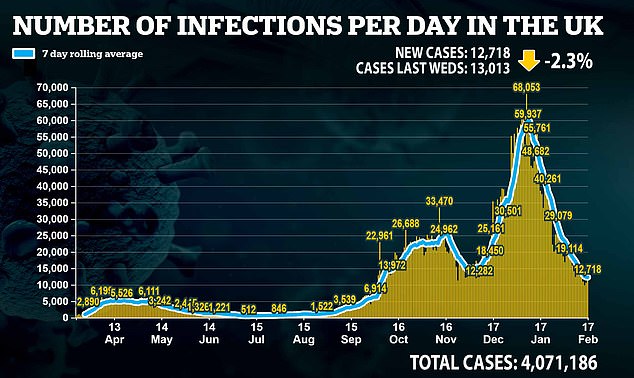Britons may never go to work with a cough again because Covid-19 has made it ‘socially unacceptable’, a top scientific adviser has predicted.
Workers suffering from a cough, stuffy nose or flu could become accustomed to staying at home in order to stop spreading respiratory illnesses.
Professor Dame Angela McLean told a Parliamentary committee today that it would be ‘powerful’ if people saw going into work with symptoms such as a runny nose, sore throat or cough as ‘socially unacceptable’.
Dame Angela, a professor in the Department of Zoology at the University of Oxford and chief scientific adviser to the Ministry of Defence, said: ‘I think it’s quite unlikely that we will return completely to the way we behaved in February 2020.
‘There are things we used to do I suspect we won’t do anymore. I suspect we just won’t go to work if we have a respiratory illness.’

Professor Dame Angela McLean told the Science and Technology Select Committee that it would be ‘most powerful’ if people saw going into work with symptoms such as a runny nose, sore throat or cough as ‘socially unacceptable’
Asked in the Science and Technology Select Committee if staying home would be mandatory, she added: ‘To be honest, I think it would be most powerful if it simply became socially unacceptable to go work with a cough.’
She added: ‘Certainly we will want people not to be going out if they know they have Covid.’
It comes as office staff are set to be told to keep working from home even as other lockdown restrictions are eased.
Boris Johnson is not expected to give a firm date for when workers will return to their desks as he unveils his plans for a return to normality on Monday.
It means the ‘work from home if you can’ message will continue to guide employers for the foreseeable future.
Britain records 10,625 Covid cases in 14% week-on-week drop
Britain today recorded a further 10,625 coronavirus cases and 799 deaths in yet another sign brutal lockdown measures have turned the tide on the second wave — as a top expert said fatalities from all causes could fall to ‘normal’ levels as soon as next month.
Department of Health figures showed daily infections dropped by 14 per cent compared to the same time last week when 12,364 were recorded, and had plunged by 37 per cent from two weeks ago.
And Covid deaths had also dipped by 25 per cent compared to last Tuesday, when 1,052 were registered.
But there are signs the UK’s coronavirus vaccine roll-out may be slowing after fewer than 280,000 doses were administered yesterday.
Officials have blamed ‘patchy’ supply for the inconsistent figures, with vaccines minister Nadhim Zahawi saying today that doses were ‘finite’ at the moment.
Eminent statistician Sir David Spiegelhalter, from the University of Cambridge, said today he was ‘sticking my neck out’ and predicting all-cause deaths could tumble to ‘normal’ levels by next month.
Advertisement
But ahead of any return, companies are reportedly drafting ‘no jab, no job’ contracts to force staff to get Covid-19 vaccinations.
Bosses in the care home sector as well as large international groups including an energy firm are making the arrangements, top lawyers warn.
It comes as it emerged all adults could be offered two jabs by August because supplies are surging.
Many large firms have already told staff they should work remotely, with some even delaying a return to the office until at least the end of the year.
However, some studies claim that productivity is hampered as workers log in from their kitchen table rather than at their desk.
Tory MPs urged the Government last night to provide clarity on when staff might be able to return to their offices.
Former party leader Sir Iain Duncan Smith said: ‘We need to get people back to work as soon as possible.
‘There are lots of reasons why work is important to our lives. It affects people’s physical and mental wellbeing and there are issues around productivity.
‘I would like to see as much detail as possible in the road map to help people to make plans. They need to know in advance.’
The message to work from home was introduced at the beginning of the first lockdown last March.
But as the surge in Covid cases eased over the summer, it was changed to urge employees to return to their offices to get Britain working again, sparking fury from Labour MPs and unions.
Announcing the third national lockdown at the beginning of this year, the PM said people should go into work only if they ‘absolutely’ could not work from home.
Asked whether the new road map would change this message, a Government source said: ‘I don’t think that will happen. We have a way to go before that changes.
‘We wouldn’t bring in a new message at this stage because it will confuse people. The road map is to set out where we’re going.’


Source link : https://www.dailymail.co.uk/news/article-9270207/Britons-NEVER-work-cough-scientific-adviser-predicts.html











